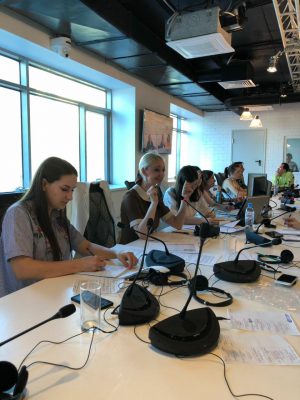Virtual meeting of the Caspian Higher School of Interpreting and Translation faculty members with the University of Geneva
 On May 3, the Caspian Higher School of Interpreting and Translation held a virtual meeting with the University of Geneva, which was focused on the preparation of the project “Modern Translation & Interpretation Technologies and Advanced Training for Conference Interpretation Trainers”. The meeting was also attended by MA students of the Caspian Higher School of Interpreting and Translation and the University of Geneva. It was also a sort of a virtual class for the students, because Olga Egorova, the Director of our School, was speaking Russian, while Manuela Motta, a professor of the University of Geneva, was speaking English, so that the students would have yet another opportunity to practise interpreting. Julia Nikitina and Alina Kireeva from the Caspian Higher School of Interpreting and Translation did the interpretation from Russian into English, while students from the University of Geneva interpreted from English into Russian. The rest of the Caspian Higher School students used that opportunity to master simultaneous interpretation skills by working in “dummy booths” and develop note-taking techniques.
On May 3, the Caspian Higher School of Interpreting and Translation held a virtual meeting with the University of Geneva, which was focused on the preparation of the project “Modern Translation & Interpretation Technologies and Advanced Training for Conference Interpretation Trainers”. The meeting was also attended by MA students of the Caspian Higher School of Interpreting and Translation and the University of Geneva. It was also a sort of a virtual class for the students, because Olga Egorova, the Director of our School, was speaking Russian, while Manuela Motta, a professor of the University of Geneva, was speaking English, so that the students would have yet another opportunity to practise interpreting. Julia Nikitina and Alina Kireeva from the Caspian Higher School of Interpreting and Translation did the interpretation from Russian into English, while students from the University of Geneva interpreted from English into Russian. The rest of the Caspian Higher School students used that opportunity to master simultaneous interpretation skills by working in “dummy booths” and develop note-taking techniques.The meeting was quite fruitful, as the parties agreed on the format of the project, the duration and timeline, discussed the possibility of involving partner universities from Russia and other Caspian states, fixed the dates of the project main events and prepared its brief description and main budget arrangements. The final version of the project has not been agreed yet, and the parties decided to “put a comma” in the negotiations, which means that the students will again have a chance to practise both consecutive and simultaneous interpreting at a real meeting with foreign partners.
It was a very valuable experience to take part in such a meeting, because this format is quite similar to the interpreter’s real working conditions. It is always more difficult to interpret a real life discussion instead of academic speeches, but isn’t it what makes the process of interpreting more interesting?





